What We Learned at the MI2 Employer Collaborative Kickoff

On June 18th, representatives from seven leading metals employers — Century Aluminum, North American Stainless, Bilstein Cold Rolled Steel, Logan Aluminum, Nucor/River Metals Recycling, Hydro Aluminum, and Fritz-Winter — gathered with educators, workforce partners, and nonprofit leaders to tackle a shared challenge: the future of our industry’s talent pipeline.
The occasion? A high-impact, strategy-focused KY SWATT (Statewide Workforce and Talent Team) retreat, hosted by the Kentucky Chamber Foundation and the Kentucky Community & Technical College System (KCTCS), with support from MI2. It wasn’t just another meeting. It was a rallying point for collaboration, innovation, and action.
"At MI2, we believe the future of our workforce won’t be handed to us—we have to build it together. That’s why this collaborative matters so much. It’s not just a meeting; it’s a movement to create smarter, more sustainable talent pipelines—driven directly by the people who hire, train, and grow talent every day," said Vijay Kamineni, Chief Innovation Officer at MI2. "We’re proud to stand shoulder to shoulder with industry leaders, educators, and state partners to co-create solutions that actually work—for our companies, our communities, and the next generation of metals workers."
Throughout the day, competition was set aside in favor of open collaboration. From Hydro Aluminum’s high school engagement efforts to Logan Aluminum’s pilot hiring programs for recent grads, attendees shared what’s working and what still needs work.
“It was great to network with local metals leaders,” said Anke Kreutz of Hydro Aluminum. “Since we share many of the same challenges, it’s good to know that workforce development resources are available to help us formulate a long-term, strategic response to address these issues.”
“There were some exciting opportunities presented by the group to work with the state of Kentucky,” said Phil Thompson of River Metals Recycling. “It was also good to collaborate with others in our industry on what’s working—and what’s not—when it comes to talent.”
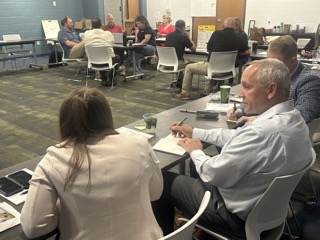
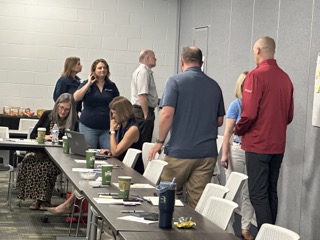
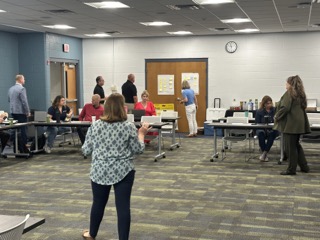
Breakout sessions sparked ideas:
- Buddy systems and structured onboarding to help reduce early-career turnover
- Bridge apprenticeships to support young workers and ESL populations
- Localized recruitment campaigns that reflect Kentucky’s communities and culture
What stood out wasn’t the list of challenges (though soft skills gaps, outdated perceptions of the industry, and weak early onboarding were all on the table). Rather, it was the shared determination to do something about it, together.
1. What’s Working
- Apprenticeships and ESL-inclusive models are driving retention.
- KCTCS data shows over 95% of Elizabethtown Community & Technical College graduates stay in-state—a powerful indicator of strong local training pipelines.
- Stronger school-industry partnerships emerged as a key opportunity for scalable impact.
2. Ongoing Challenges
- Persistent outdated industry perceptions in classrooms
- Misalignment between training programs and real-world job needs
- High turnover in the first 6–12 months due to weak onboarding practices
3. Ideas in Motion
- Onboarding boosts: mentorship, early culture immersion, structured follow-ups
- Bridge training models: community-based pathways for young and ESL workers
- Career branding campaigns: positioning metals careers as high-skill, high-pay opportunities
Workforce Data Insights
- MI2 presented fresh data on high-demand roles in mechanical, electrical, and operator positions. Also noted: Kentucky’s growing population of underemployed college grads further proof that the skilled trades path deserves louder amplification.
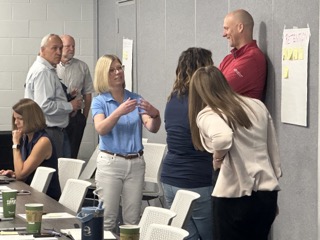
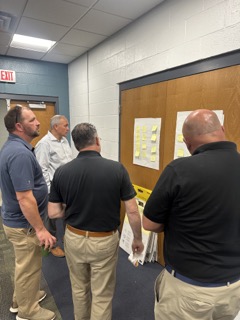
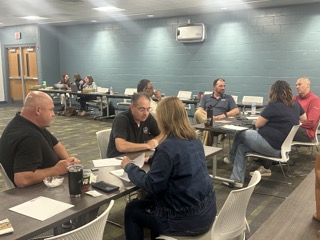
What’s Next
Using an effort-impact mapping process, participants homed in on top-priority actions:
- Community engagement
- Employer branding and career awareness
- Flexible training pathways
Kentucky isn’t just participating in the global metals economy it’s helping lead it. We’re home to North America’s largest stainless steel mill, a major copper recycling facility, and the continent’s most advanced aluminum recycler.
Addressing workforce gaps here isn’t just a local issue. It’s a national competitiveness issue.
KY SWATT has proven successful in other high-growth industries like healthcare and construction. Now, the metals sector is harnessing that same coordinated, data-driven approach and MI2 is proud to help lead the way, offering strategic support, funding, and cross-industry connections to turn good ideas into pilot-ready programs.
“Together with MI2, SWATT will support improved alignment with workforce and education assets based on critical priorities outlined at our workshop in June,” said Jessie Schook, MI2 board member and Vice President of Workforce and Economic Development. “The commitment from MI2 companies allowed us to lay the foundation for a statewide workforce plan for the metals sector in Kentucky.”
This retreat was a reminder that no one company and no one solution can meet Kentucky’s workforce challenge alone. But by working across silos, plant floors, classrooms, boardrooms, and beyond, we’re already shaping a stronger future.
To all who showed up and spoke up in Elizabethtown: thank you. Your leadership is the foundation of a more innovative, resilient, and inclusive metals workforce.
Let’s keep building.
Explore Our Latest Insights
Discover valuable resources and articles on innovation.

